Biden is gone, Harris is here.
After Biden chose to withdraw from the election, Trump has been in the spotlight recently. The story of the old opponent surrendering and escaping death, the halo of the male protagonist is dazzling, showing Trump's complacency. The crypto world is also boiling. The speeches of politicians at the previous Bitcoin conference have aroused positive sentiment. The highly anticipated presidential candidate Trump has remained firmly optimistic. Even his son has followed suit, and the whole family has come together to speak out in the crypto field.
But unfortunately, it is not uncommon in the political circle to be applauded but not popular. On August 6, US Vice President Kamala Harris won the party election, locked in the Democratic presidential candidate nomination, and officially stepped out from behind the scenes to face the general election. Although the crypto industry has high hopes for Trump, Kamala Harris is not as weak as the aging Biden, and performs well in the polls.
According to poll data compiled by the US election information website "Real Transparent Politics", as of August 6, Harris was ahead of Trump by an average of 0.2 percentage points in national polls, but in key "swing states", Trump was ahead by 1.5 percentage points. The approaching data made the battle between the two sides more intense. According to Xinhua News Agency, Harris and Trump are investing about 98% of their campaign ads in five of the traditional "swing states". Among them, the tiny crypto voters have once again become the target of the two parties.
From the current point of view, Trump has regarded himself as the "crypto president" and gained a first-mover advantage. Harris, on the other hand, was quite ambiguous. He did not attend the Bitcoin conference, nor did he publicly explain his attitude towards encryption. His running mate Tim Waltz does not seem to be a crypto enthusiast.
Where will the flag of encryption eventually fly? Obviously, the Democratic Party will never give up this part of the votes.
Harris, the ultimate buff of political correctness
Before discussing the attitude towards encryption, let's briefly introduce Harris. Just from Harris's point of view, as the first black female vice president in American history, she is also quite legendary in her home country.
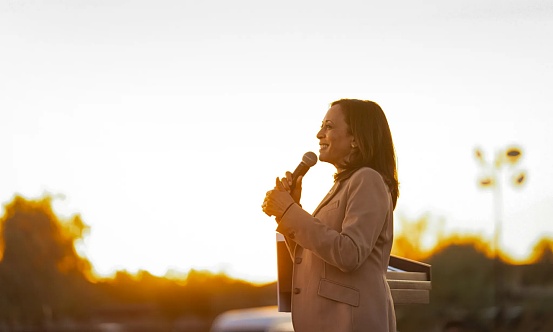
Kamala Harris participated in the event, from the White House website
Kamala Harris was born in 1964. Her father is an African immigrant from Jamaica and her mother is a Tamil from southern India. Both parents are senior intellectuals and active participants in the American civil rights movement. They advocate racial equality and oppose racial segregation, which also laid the foundation for Harris' own political beliefs in the future.
As an adult, Harris entered Howard University, which is mainly composed of black students, to study political science and economics, and obtained a doctorate in law in 1989. After graduation, she came to Alameda County, California as a deputy prosecutor, and officially embarked on a political career.
As an African American, Asian, and female, she has a lot of political correctness buffs. Harris is also very good at using her own advantages, playing the racist card, and taking the opportunity to stand on the side of the more friendly Obama. In order to gain the support of Chinese Americans, she also deliberately gave herself a Chinese name "He Jinli" to show her friendliness.
Putting aside the scandals in the middle, Harris's career was smooth sailing as expected with her excellent speaking skills and her own efforts. In 2003, Harris became the district attorney of San Francisco. With the help of Obama, she was elected attorney general of California in 2010 and successfully re-elected in 2014, becoming the first black woman to hold this position in the United States.
In 2019, the ambitious Harris officially announced her participation in the 20-year US election, and became famous after she pointed out Biden's racism in a sharp speech in the party debate. However, due to her mixed reputation and often inconsistent political propositions when she was the attorney general, and the extremely strong lineup of candidates in the Democratic Party that year, Harris eventually returned before the primary election.
However, although she did not get the presidency, she accidentally got the position of vice president. After the Floyd shooting in 20 years, a large-scale minority movement broke out in the United States at that time. Therefore, Harris, who has a natural advantage in this regard and is also a woman, was chosen by Biden to be his running mate regardless of past grudges. In the final analysis, it was to ensure the balance of votes.
During her time as vice president, Harris had no actual political achievements and did not become a political focus because she was responsible for the complex immigration issues. Voters' attention was also mediocre, and the party's evaluation of her was only "a very typical vice president." Therefore, after Biden announced his withdrawal from the election, there were many controversies within the Democratic Party, but from the current perspective, the Democratic Party is actually facing a situation where no one is available and can only bet. In the hasty succession, Harris even inherited 1,300 staff members and $96 million in funds who had served Biden's campaign, which also attracted the ridicule of Trump and the opposition.
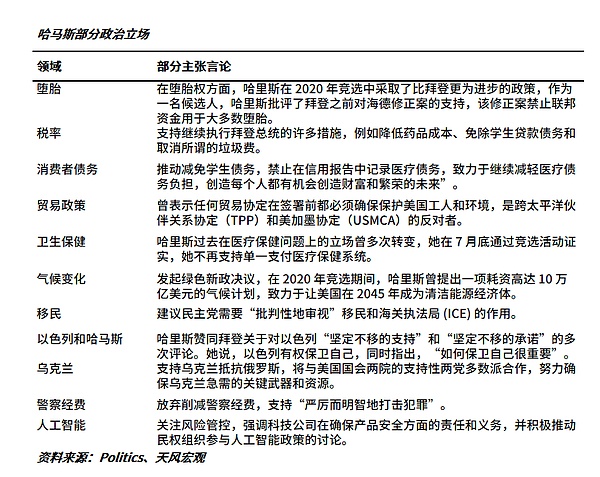
From the perspective of political propositions, Harris and Biden are of the same lineage. She inherits and continues Biden's policies on taxation and diplomacy. Compared with Trump's unilateralism, Harris emphasizes a foreign policy that opposes isolationism and advocates international cooperation. However, in other aspects, Harris is innovative and conservative, highlighting individual differences. For example, in trade policy, Harris opposes free trade, and also proposes more radical green economic issues. In terms of advantages, compared with Biden, age is no longer a problem for presidential candidates, and she is more popular with women and minorities. Recently, she also opened TikTok to get closer to young voters and gained 4 million fans.
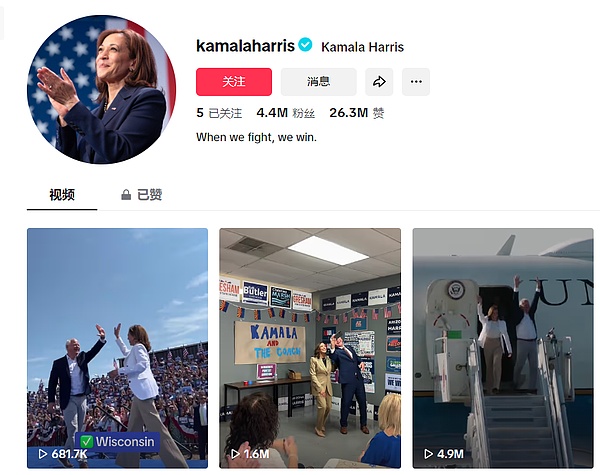
Harris's tiktok account has attracted much attention, source tiktok
Harris is "in contact" with encryption
But back to encryption, what is the attitude of Harris and her party towards encryption?
The fact is that until now, Harris himself has not directly stated his views on encryption, and from the disclosed financial situation, the Harris family does not hold any crypto assets. But it is precisely because of this that there are many rumors surrounding his position.
One is the denial faction. Due to the harsh attitude of Biden's major political parties towards encryption before, many people believe that Harris may also deny encryption. David Bailey, CEO of Bitcoin Magazine, even revealed that a major Democratic donor revealed Kamala's negative views on cryptocurrencies behind the scenes, saying "Kamala privately said that Bitcoin is criminals' money." And his opponent Trump said bluntly in his speech at the conference, "Harris is an opponent of encryption." It is precisely because of this that Harris was criticized by the encryption industry and ultimately did not attend the Bitcoin conference.
As for her running mate, 60-year-old Minnesota Governor Waltz, a former member of the U.S. Army National Guard, has the characteristics of a traditional military and political figure. He has repeatedly publicly called Trump and his running mate JD Vance "weirdos" with exaggerated behavior, which is attractive to older white groups and conservatives. Overall, Waltz has not expressed his views on encryption, but from his insistence on a 100% clean energy policy, it can be seen that the Bitcoin mining industry may not be so popular with him.
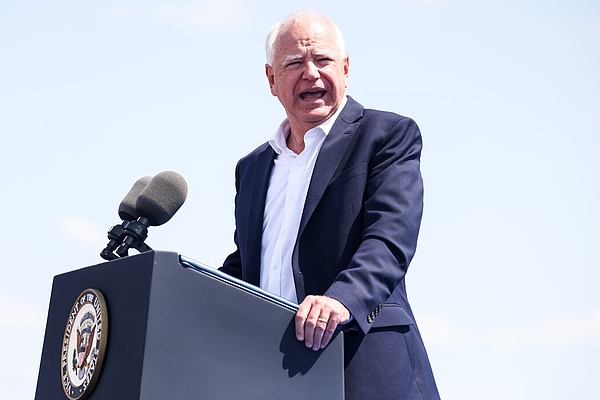
Harris' running mate Tim Waltz, source: New York Times Chinese website
The second is the supporters. In response to Trump's assertion, many people from the Democratic Party also stood up to oppose it, saying that Harris is taking the initiative to understand the encryption industry and does not fully follow the harsh claims. Democrat Wiley Nickel said at the Bitcoin Conference that 28 elected Democratic members wrote to party leaders and proposed a joint statement, hoping to add support for digital assets to the party platform, choose a SEC chairman who supports innovation, and engage with the industry in a meaningful way. From a personal perspective, Skybridge founder Anthony Scaramucci also mentioned that Harris is not closely related to Elizabeth Warren, a clear encryption opponent in the party trusted by Biden, and Gary Gensler, the current chairman of the SEC.
In fact, it is impossible for the Democratic Party to sit idly by for the tempting crypto votes. This is indeed the case. Just last week, the Harris team hired former Binance consultant David Plouffe and former Ripple board member Gene Sperling to join the campaign, and the thawing attitude is obvious.
On July 29, comprehensive reports said that the Harris team is contacting the US cryptocurrency industry, including Coinbase, Circle and Ripple, to ease the tension between the Democratic Party and the crypto industry. According to the team, it hopes to have a more constructive dialogue with the crypto industry and establish a regulatory framework conducive to the development of cryptocurrencies. Last Thursday, the California Democratic Party also held its first meeting with the crypto industry.
In addition, candidates will never go against money. According to the disclosed fundraising documents, the Trump campaign received more than $3 million in crypto investment in the second quarter alone, with donations from the founders of several crypto companies such as Winklevoss, Kraken, and Messari. In response, according to FOX Business, the US Democratic Party recently launched the "Crypto for Harris" campaign to counter Trump's appeal in the cryptocurrency industry. Democratic crypto supporters plan to hold an online town hall meeting on Thursday, when several guests including Mark Cuban and Anthony Scaramucci will speak to discuss ways to support Harris' campaign and fundraising.
In this regard, under pressure from vote support and consortiums, another 180-degree turn may also happen to Harris. Given that Harris's iron vote bank did not previously cover the crypto field, substantive actions and the specific degree of relaxation remain to be seen. In the meeting last Thursday, a reporter broke the news that the communication situation was very tense, and it was almost a one-sided fierce attack and emotional venting of crypto companies on the White House policy. In the end, neither the White House representatives nor Harris's advisers made any commitments. The Federal Reserve recently required the crypto-friendly bank Customers Bancorp to give 30 days' notice before establishing any new banking relationship with crypto companies, which also made the industry re-examine Harris's attitude towards crypto. What is certain is that before the election really ends, the two parties will inevitably have a new arena competition in crypto. The election is tense, and focusing on immediate interests is the best policy. For the crypto industry, betting on both sides may be the best way. After all, it is not easy to be consistent in words and deeds, especially in front of politicians who talk nonsense. Data from Polymarket shows that the wind of encryption is also blowing towards Harris, and Harris has a slight advantage over Trump with a 52% chance of winning.
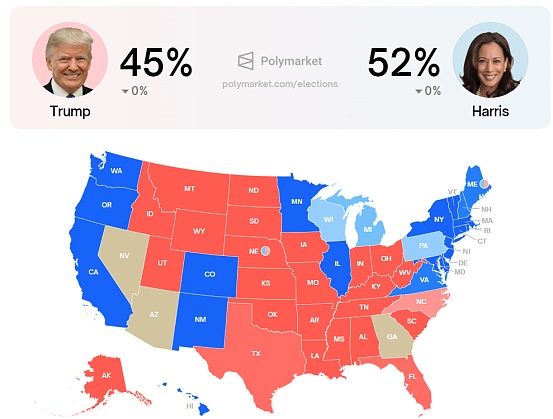
Crypto market forecast data, source Polymarket
On the other hand, a battle of values surrounding the election is also erupting in Silicon Valley. Silicon Valley has always been a solid backing for the Democratic Party, but Biden's previous tough stance on technology antitrust has damaged this vote bank, causing some Silicon Valley representatives such as Ben Horowitz and Marc Andreessen to support Trump. Harris had previously assisted in the establishment of artificial intelligence regulations, and the foreseeable dovish attitude has caused Silicon Valley to turn its attention again.
From the perspective of personal values alone, industry insiders said that the vast majority of people are more receptive to Harris's political views, and those who have currently turned to support Trump in a high-profile manner do not represent all of Silicon Valley's ideas. Technology executive and major Democratic fundraiser Steve Spiner even declared that "for every one person who supports Trump, there are 20 who support Kamala". At present, more than 800 venture capitalists, led by Netflix co-founder Reed Hastings and LinkedIn co-founder Reid Hoffman, have pledged to support Harris.
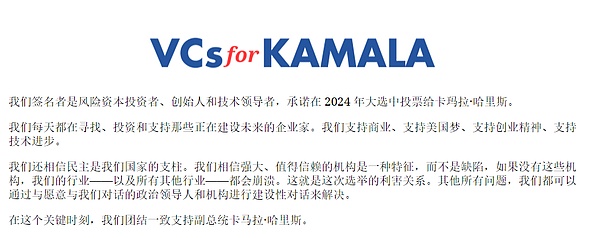
Silicon Valley launched a Kamala support campaign, source vcsforkamala official website
Investors also hold the same idea. For example, Cuban had previously clearly expressed his support for Trump, but now he is actively running for Harris. Although this move does not mean much for votes outside of fundraising, after all, most venture capitalists are not members of swing states. But it can be seen that even if only considering the probability of being elected, Harris will not be easily defeated. On September 10, Harris will have her first head-on confrontation with Trump. Both parties have agreed to participate in a debate hosted by ABC News on September 10. The first situation will greatly affect the subsequent public opinion.
In any case, the drama of American politics will continue for some time, and the MEME of crypto spectators still has a long way to go. Focusing on current interests and not pinning hopes on anyone is the way to survive in the crypto world.
 JinseFinance
JinseFinance
 JinseFinance
JinseFinance JinseFinance
JinseFinance Alex
Alex Catherine
Catherine Beincrypto
Beincrypto Beincrypto
Beincrypto Beincrypto
Beincrypto Bitcoinist
Bitcoinist Nulltx
Nulltx Nulltx
Nulltx